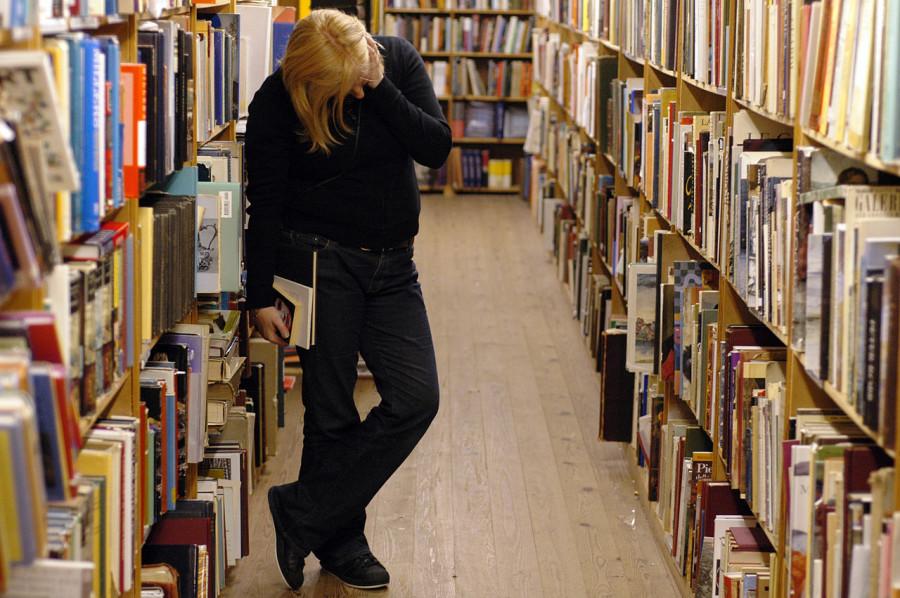To continue reading: touch paper and slide into your place
Cleveland in Color
I entered my graduate program eagerly anticipating a stack of new books. The prospect of the program was nerve-wracking, and I anxiously wondered how much my hand skills would serve me in the lab and clinic. Through it all, knowing books were still a part of the learning process helped take the edge off my panic and instill a soothing sense of the familiar. So long as I had a book, I knew I would be okay.
Ask anyone close to me: “avid reader” makes the list right under “five-foot-two.” Even before I learned to write, my mother reports I often scribbled squiggly lines across pages and presented them to anyone within my chubby-armed reach, autographed I’m sure. You’re welcome.
Books were portals out of our tiny apartment into the miraculous unknown, an arena that was essentially restricted. Admittedly I am romanticizing my love of books to mask what it was on most days; a hobby for a lonely, lanky girl. But the habit thankfully stuck.
With the advent of limitless technology right at our fingertips, the written word is mid-metamorphosis. Books became e-books on e-readers. Letters became emails. Love notes were reduced to “<3” and a winky face. We have access to a million pages on a single screen. It makes me wonder if man developed thumbs solely to text – or perhaps just swipe right on Tinder.
Which also means the mating ritual (see “<3” above) has changed. Even our colloquial lingo has shifted to a lazy, cutesy drawl. I live with a high school student and an elementary one (my younger sister and brother, respectively). Decoding their banter is never a grand challenge, but I won’t say I haven’t checked Urban Dictionary a few times beneath the dinner table.
I’m not here to wag my cane at the new generation or accuse e-readers of ruining the novel. There are enough nostalgic oldsters doing that for me already and I appreciate their steely dedication.
I consider our course of modernity to be expected. I imagine the shift in social norms when the telephone was a new thing. Suddenly people were making “calls.” What the hell! Imagine, also, the dawn of the light bulb. What a crazy new generation. No one appreciates moonlight anymore.
Practically all inventions brought social changes with them. Soap made it unacceptable to show up to a date with BO. Indoor plumbing meant an outhouse was O-U-T out. The automobile meant not visiting your parents on a long weekend was your own selfish fault, not faulty circumstances. And lest we forget the Snuggie, the most effective form of birth control for men and women alike.
My gripe isn’t with technology – a battle I would readily lose. Like it or not, the world is moving forward, concentrated on a single blinking screen. Third world countries have access to WhatsApp before water. Surveillance cameras miss what an iPhone catches in an instant.
And in grad school – much to my alarm – we don’t get books anymore. We get access to e-books through a vendor called VitalSource Bookshelf. But there are no books and the “shelf” is a list of digital titles. It’s hard to describe what I felt without coming off as ridiculous.
I think e-books are practical. They are cheap, accessible, compact and convenient. But e-books are not books, nor will they replace them. The charm and ease of physically perusing a book is lost. Some say they prefer e-books because they can find what they are looking for easily (cue index and glossary). Students also say it’s easier to cite from an e-book. More like copy-paste (the less fraud, the better). Multiple sources have weighed the pros and cons of each medium to come to the vague catch-all: “they are different and the same.”
You open an e-book but you want to check your Facebook messages. You want to watch that one cat video that your crush sent you with the caption “<3.” You want to reply to all of your emails at once and finally post those filtered pics to Instagram. You want to tweet about how boring this e-book is.
I know, because I go through my Internet to-do list just as I’m about to start reading and writing. I once wrote a seven page break-up email during an all-nighter, and I’ll be damned if it wasn’t the most eloquent thing to come out of me – despite deciding last minute to merely save as draft. The other tab open at the time was the e-book, exam chapters highlighted and all.
A confession from a self-proclaimed avid reader, someone who would rather curl up with a book than a male model: if it’s hard for me to focus on reading, then I applaud those who are productive with an e-book. I’ve learned in my short exposure that if I want to mean business, I have to shut off the screen. I have to sit down and touch the paper of a book, write in it, put a Post-it note somewhere. Mark my territory. This is the act of “working” for me.
If it’s taking you six days to churn out a three-page paper, or if you find yourself on social media when you should be researching sociology, consider cutting the cord and powering down. Go to the library. Turn off your phone and throw it in your backpack. Find books on what you are supposed to be learning.
Read.
Sarah Jawhari is a biweekly columnist for the Observer.


